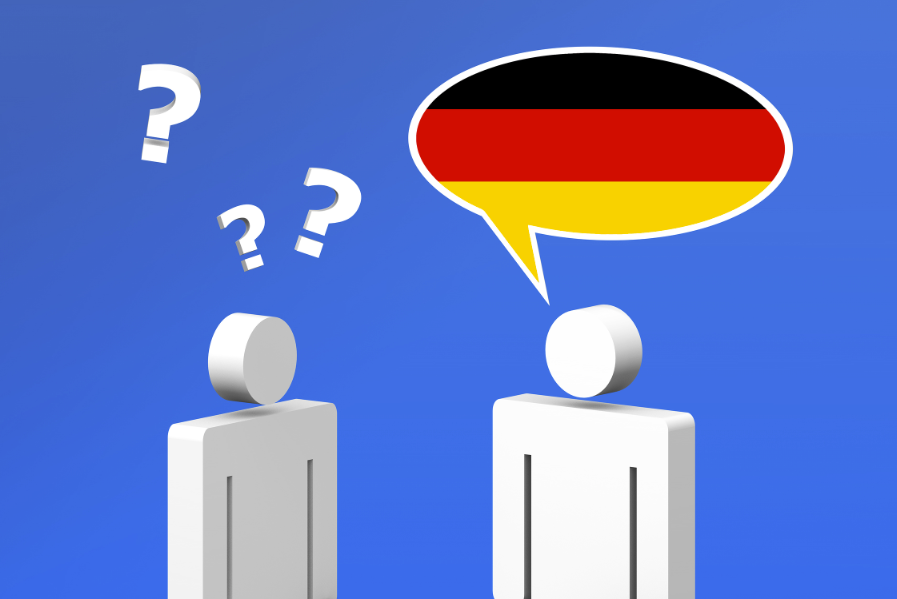What linguistic instructions would you give your translation agency when working with a commercial translation from English to German or German to English? Below are some talking points to use when discussing your localizing strategy, that will ensure the most accurate translation the first time around.

When translating from English to German, there is sometimes a preference to use an English word in the German translation like ‘internet’ as you will see below. Like many things, this is a preference, which depends on your tone of voice and linguistic guidelines. It often sounds more modern to use the English term, but as a rule the German prefer using their own words, which often combine multiple words in order to increase clarity.
If you’re translating from German to English, there are some playful words, which are tough to find an English equivalent. One fun example is the descriptive word: schmatzen – the smacking sound a noisy eater makes! You can discover more difficult to translate words below.
It won’t just be me that found it so confusing to remember the second verb in a sentence, nearly finish what you’re saying, then remember to put the verb in at the end. And that’s before you get onto pausal clauses and the rest. Mind you, this is made even more complex when you think that German sentences tend to be longer and more complex than English sentences. German also has a flexible word order, so the subject, verb, and object can appear in different positions within a sentence, allowing for more variation in sentence structure.
German has a flexible word order, and the position of words can affect their meaning. This can make it challenging to translate sentences accurately, as the word order may need to be adjusted to convey the same meaning in the target language. It’s difficult to explain but for example the sentence “Ich sehe den Mann mit dem Fernglas” (I see the man with the binoculars) could be translated to “I see the man with the binoculars,” or, “With the binoculars, I see the man”.
Although German words can be fun to say, the pronunciation has different rules to say Dutch. This makes it difficult to remember how to pronounce your vowel sounds if you switch between the two. I remember a school friend looking up the word ‘Umgebung’ which means ‘surrounding area’. We thought you pronounced it with three balanced tones [um-G-Bung}. Unfortunatly, our teacher pointed out it was ‘um-geHy-bung’ which was less fun and bouncy.
It’s difficult to compare the average vocabulary needed for daily life, but it surprised me to find that the English language has a larger vocabulary than German.
According to the Oxford English Dictionary, the English language has over 170,000 words currently in use, with an additional 47,000 obsolete words and around 9,500 derivative words.
In contrast, estimates of the number of words in the German language vary, but most sources suggest that German has around 100,000 to 200,000 words, including compound words. This range is much wider, which I find hard to interpret, which is why this comparison needs a pinch of salt. It’s worth noting that German compound words can be quite long and can be counted as a single word, which can affect the estimates.
In terms of daily use, it’s difficult to compare directly, as the frequency of word usage can vary depending on the context, region, and individual speaker. However, since English is a widely spoken and used language worldwide, it’s likely that a larger number of English words are used on a daily basis compared to German.
These again can be more complex and longer, as there is a habit to combine two or more words into one (creating a compound word). I’ve had fun looking for the top 10 German Compound words. If you want to impress a German friend, try some of these!
We have so many new words entering the dictionary each year, so that many new terms will simply be used in the language of the country from which the term originated. I asked Chat GPT for some examples of additions to the German dictionary, and it was interesting to see how it used many English-based German terms, showing how our cultures are evolving. It’s interesting to see the themes around equality, environmental impact, technological advances, and the impact of the Covid pandemic.
Words recently added to the German dictionary, along with their meanings:

Although German is very structured, there are some basic pitfalls you need to be aware of concerning tone of voice, grammar, cultural considerations, and word gender.
German tends to be a more formal language than English, and this is reflected in its writing style. German has a variety of formal pronouns and verb forms that are used in formal writing, whereas English tends to use a more consistent style regardless of the formality level.
Would you be offended if someone you didn’t know used the informal ‘Sie’ in an outreach email? Many German people would consider this rude, and would prefer the formal tone in these communications.
It’s not just ‘Sie’ and ‘sie'(singular and plural of you), as ‘sie’ is also distinguished between ‘formal sie’ and informal sie – friends family and colleagues are in a different category to professional groups, managers and seniority figures. With such complex grammar and being so easy to offend, context and tone of voice is always needed when translating.
German punctuation differences when translating. German uses more commas than English, particularly in long and complex sentences. German also has some unique punctuation marks, such as the umlaut and the Eszett (ß). Trying to get a British person to pronounce something correctly with an umlaut is… interesting. It’s just not as easy as Germans expect.
Unlike English, which generally does not have grammatical gender, German nouns are either masculine, feminine, or neuter. This can make it challenging to translate nouns, as the gender may not align with the target language. For example, the word “Mädchen” (girl) is neuter in German, but in English, it is typically referred to as feminine.
Translators must also be aware of cultural differences between the source and target languages, as certain expressions, idioms, and references may not be immediately understood by speakers of the target language. For example, the German phrase “Das geht mir auf den Keks” (literally “that’s getting on my cookie”) means that someone is annoying or bothering you, but translating it directly into English, as you can tell, would not convey the same meaning. A more accurate translation might be “That’s getting on my nerves.” You can translate that from English back into German with no problem, but you lose the lightheartedness.
As with any language, there are some words and expressions in other languages that are difficult to translate into German. Here are a few examples:
Schadenfreude – Schadenfreude is a German word that means taking pleasure in the misfortune of others. While this word exists in German, it can be difficult to translate into other languages. It’s been known to be the basis of comedy acts as the comedian’s discover this word and it’s meaning on their approach to a joke.
Gemütlichkeit – Gemütlichkeit is a German word that refers to a feeling of warmth, friendliness, and coziness. It’s a concept that’s often associated with German culture and can be difficult to express in other languages. It’s even included in their drinking songs – so listen out for it if you go to a Bierhalle!
Lebensraum – Lebensraum is a German word that translates to “living space” or “habitat”, which should be easy to use and innocuous. However, it’s a term that is associated with the expansionist policies of Nazi Germany in the early 20th century, which makes it a difficult term to use without invoking those connotations.
Verschlimmbesserung – Verschlimmbesserung is a German word that refers to an attempted improvement that actually makes things worse. It’s a concept that’s difficult to express in other languages, as it’s a combination of “verschlimmern” (to make worse) and “verbessern” (to improve). I feel this is a word that should be used more often, as how often do we feel this?
Weltschmerz – Weltschmerz is a German word that refers to a feeling of melancholy or pessimism about the state of the world. It’s a concept that’s difficult to express in other languages, as it combines “Welt” (world) and “Schmerz” (pain). Again, given the increasing awareness and global climate rallies and cultural changes, this is a word which will sadly be used more often.
Now after looking through those talking points, which would cause you the most problems with your next translation? How will you prepare to brief your translation agency with the next English/German localization project? You may find Jonckers Language Analysts offer a valuable service, as they can help you create your own terminology, linguistic instructions and basically everything you need to be contextually aware and get your translations right the first time!
Feel free to get in touch, or use our chatbot, if you have a complex translation project. Alternatively, if you just need a set of documents translated, did you know that you can upload them into our Translate Now service for an instant translation quote with online payment? Visit www.wordsonline.com to try it out.
If you want to find out more about German translations, and establish why you need professional translators for German or other languages we translate in, you can also carry on to our languages page.
Upload your documents to WordsOnline and pay online for a fast, simple service. 10% discount on your first order
We will help you transition to the new world of continuous localization!

